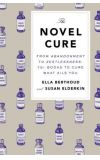
19 Sep 2013 04:40:02
It has taken a while for my health board to realise the benefits of bibiliotherapy, but the idea is an old one. Seneca wrote his Consolation to Marcia almost two thousand years ago, but it is still powerful advice for a mother mourning the death of her son. Robert Burton's sprawling Anatomy of Melancholy is an intermittently helpful, but always involving, series of meditations on sadness and its alleviations. Absurd as it sounds, books like these would now be crammed into a lumpy genre called "literary non-fiction", but in his Religion for Atheists Alain de Botton makes the claim that since the latter half of the 19th century we've turned to fiction rather than non-fiction to encourage self-examination. "English literature now has a triple function," he quotes George Stuart Gordon, "to delight and instruct us, but also, and above all, to save our souls and heal the State."
A tall order, but Ella Berthoud and Susan Elderkin would agree; as colleagues of de Botton at the School of Life in Bloomsbury their belief in the curative powers of the novel has led them to set up a formal bibliotherapy service "for life's ailments". They prescribe only fiction ("the purest and best form of bibliotherapy"), and apart from occasional excursions into the classics, concentrate on books written within the last couple of centuries. The Novel Cure is the distillation of those recommendations. "Our apothecary contains Balzacian balms and Tolstoyan tourniquets," they tell us in their introduction, "the salves of Saramago and the purges of Perec and Proust".
At the outset Berthoud and Elderkin make it clear that they are not going to make any distinction between emotional and physical pain; they are as interested in literature that will help you heal a broken leg (Cleave by Nikki Gemmell) as much as a broken heart (Jane Eyre). Opening almost randomly in the "L"s, I find "left out, feeling" (Carson McCullers's The Member of the Wedding), "libido, loss of" (Mario Vargas Llosa's In Praise of the Stepmother), "long-winded, being" (Cormac McCarthy's The Road) and "love, unrequited" (four novels: Turgenev's First Love, Hardy's Far from the Madding Crowd, Goethe's The Sorrows of Young Werther and Ann Patchett's Bel Canto). One of the pleasures of this entertaining book is the way it drives you to agree or disagree with the authors' choices. Under "overwhelmed, by the number of books in your house" where is Bohumil Hrabal's Too Loud a Solitude? Or for "drugs, doing too many" what about William Burroughs's Junky? But even as you're spluttering at the omissions, you'll find yourself nodding with self-satisfied pleasure that one of your favourites has been singled out for its healing properties.
Each ailment is followed by a short precis, occasionally written as a parody of the book recommended. Search out those ailments you have painful experience of (constipation perhaps? Shantaram), or just flick through until something catches your eye (itchy teeth? Saul Bellow's Henderson the Rain King). An index of authors lets you seek out your darlings and cross reference them with the ailments they've been prescribed for. The result is more bibliophilia than bibliotherapy; an exuberant pageant of literary fiction and a celebration of the possibilities of the novel.
If there's a tension within the book, it's in the dissonance between the whimsical entries and the serious ones: a passage on despair is followed by "desperately chasing after a woman even when she's a nun". An exploration of eating disorders is followed by "egg on your tie". Though there's plenty of flippancy it nonetheless contains the sort of grounded, practical advice that GPs are trying to pass on every day: under obesity I was delighted to find Muriel Spark's instruction to "eat half of what you would normally eat … I offer this advice without a fee."
Unfortunately for my patient, there is no entry for anguish (perhaps he wasn't being specific enough; there is "angst, existential" – Hesse's Siddhartha – and "angst, teenage" – Salinger's The Catcher in the Rye, of course). In his 1960s masterpiece A Fortunate Man, in which he followed the daily work of a GP, novelist and essayist John Berger asked how it is possible for a clinician to face up to the anguish at the heart of human life: "I speak of the anguish of dying, of loss, of fear, of loneliness, of being desperately beside oneself, of the sense of futility." The Novel Cure is at its best when it tackles these fundamental questions, and many of its titles will be added to my bibliotherapy list.

